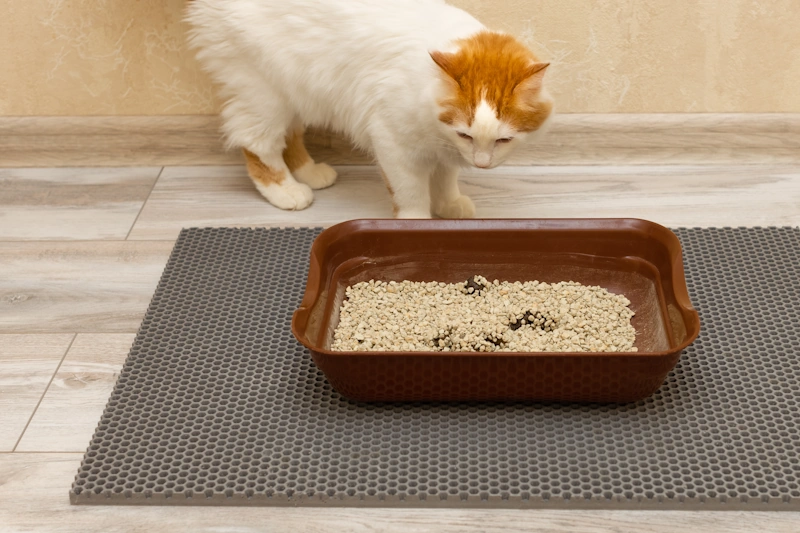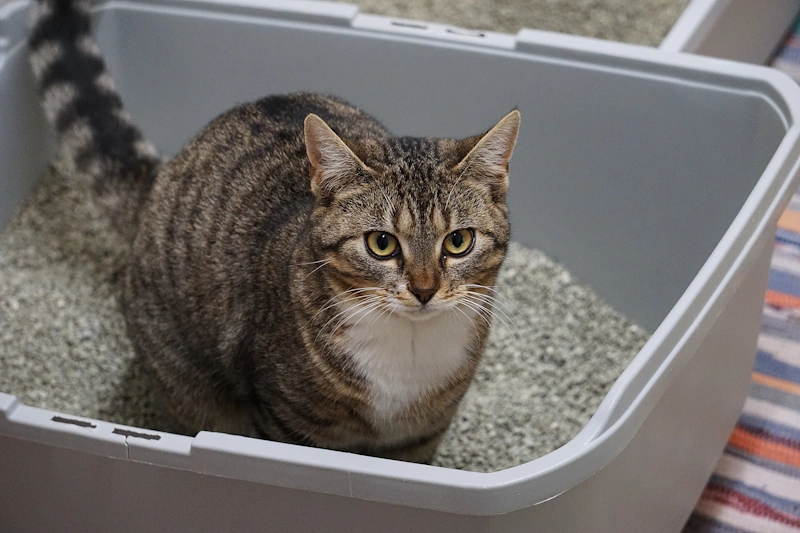What causes diarrhea in cats? Discovering that your cat has been experiencing diarrhea during litter box cleanups is a common concern that millions of cat parents share yearly. It’s not uncommon to encounter variations in the presentation of feline diarrhea, ranging from a soft and gooey consistency to a streaky bloody appearance or even an unfortunately watery form. If you’ve observed these changes in your cat’s bathroom habits, rest assured that you are not alone in facing this issue.
What causes diarrhea in cats? Various factors can cause feline diarrhea, and understanding the potential reasons behind it is crucial for addressing your cat’s health. It might be related to dietary changes, the introduction of new foods, or even stress. Infections, parasites, or underlying medical conditions can also contribute to gastrointestinal issues in cats, manifesting in changes in stool consistency.
As a responsible cat parent, monitoring your feline friend closely and noting any additional symptoms or behavioral changes is essential. If diarrhea persists or is accompanied by signs of distress, lethargy, or a lack of appetite, seeking prompt veterinary attention is advisable. Your veterinarian can conduct a thorough examination, run necessary tests, and provide guidance on the most appropriate course of action to alleviate your cat’s discomfort and address the underlying cause.
Remember, you’re not alone in navigating what causes diarrhea in cats and seeking professional advice ensures your cat receives the care and attention needed to restore its digestive health. Regular veterinary check-ups, a balanced diet, and a comfortable environment can contribute to your cat’s overall well-being, minimizing the chances of recurring gastrointestinal issues.
What is Cat Diarrhea?
What causes diarrhea in cats? Cat diarrhea is characterized by softer, looser, or more watery stools than the norm. Felines experiencing diarrhea may exhibit an increased frequency of defecation, potentially leading to accidents in the house. This condition can manifest with additional concerning signs such as the passage of blood, mucus, or parasites in their feces.
What causes diarrhea in cats? While many instances of cat diarrhea resolve on their own within hours or days without any intervention, heightened attention is warranted when the condition persists for an extended duration. Cats that continue to experience diarrhea for over a few days or display more severe symptoms, including vomiting, loss of appetite, bloody stools, excessively watery stools, or lethargy, should be promptly taken to a veterinarian for evaluation.
What causes diarrhea in cats? Recognizing that smaller cats and kittens are particularly vulnerable to diarrhea-related dehydration is crucial. Consequently, any diarrhea in these feline companions should be treated with utmost caution, and veterinary evaluation is imperative. Dehydration poses a significant risk to their health, and professional intervention can address the underlying cause of diarrhea, rehydrate the cat, and ensure a swift recovery.
What causes diarrhea in cats? While some cases of cat diarrhea may be self-limiting, persistent or severe instances demand immediate veterinary attention. Early intervention not only alleviates discomfort but also safeguards the overall health and well-being of the cat, particularly in the case of smaller cats and kittens prone to dehydration. Regular veterinary check-ups and proactive care contribute to the prevention and management of gastrointestinal issues, ensuring a happy and healthy life for your feline friend.
Symptoms of Diarrhea in Cats
· Defecating with increased frequency
· Straining to defecate
· Accidents in the house
· Nausea or vomiting
· Loss of appetite
· Tiredness or weakness
· Abdominal pain
· Weight loss
· Mucus or blood in the stool
· Worms in the stool
What Causes Diarrhea In Cats?

Other potential causes of diarrhea include:
· Digestive bacterial overgrowth
· Cancer
· Food allergies
· Hepatitis
· Hyperthyroidism
· Inflammatory bowel disease
· Liver disease
· Parasites
· Pancreatitis
· Antibiotics and other drugs
· Toxins
· Viruses
Cat diarrhea is a common concern for pet owners, and addressing it promptly is crucial for the well-being of your feline companion. While occasional mild diarrhea may resolve on its own, persistent or severe cases require attention. Understanding the potential causes and available treatments can empower cat owners to take the appropriate steps to alleviate their cat’s discomfort and promote recovery.
Identifying the Underlying Cause
What causes diarrhea in cats? Before diving into specific treatments, it’s essential to identify the underlying cause of cat diarrhea. Cat diarrhea can stem from various factors, including dietary indiscretions, changes in food, infections, parasites, inflammatory bowel disease, and more. A thorough examination by a veterinarian is crucial to pinpoint the cause accurately.
Veterinary Consultation
What causes diarrhea in cats? If your cat is experiencing persistent or severe diarrhea, seeking professional veterinary advice is paramount. A veterinarian will conduct a comprehensive physical examination and may recommend additional diagnostic tests such as blood work, fecal analysis, and imaging studies to determine the cause of the diarrhea.
Treatment Approaches:
Dietary Modifications
Switching to a bland diet: Transitioning your cat to a bland diet, such as boiled chicken or rice, can help ease digestive upset.
Prescription diets: In some cases, veterinarians may recommend specialized prescription diets formulated to address specific gastrointestinal issues.
Hydration Management
Fluid therapy: If dehydration is a concern, especially in smaller cats or kittens, veterinarians may administer fluids to restore hydration.
Medications
Anti-diarrheal medications: Depending on the cause, veterinarians may prescribe medications to control diarrhea.
Antibiotics: If bacterial infections are identified, antibiotics may be prescribed.
Parasite Treatment
Deworming medications: If parasites are identified as the cause, deworming medications will be administered to eliminate the infestation.
Probiotics
Probiotic supplements: Introducing probiotics can help restore the balance of beneficial bacteria in the digestive tract, promoting gastrointestinal health.
Addressing Underlying Conditions
Inflammatory bowel disease or other chronic conditions may require long-term management with medications and dietary adjustments.
Home Care
While under veterinary care, there are supportive measures cat owners can take at home:
Monitoring: Keep a close eye on your cat’s behavior, appetite, and litter box habits.
Isolation: If multiple cats are in the household, consider isolating the affected cat to prevent the spread of infectious causes.
Maintain a Consistent Diet: Once your cat’s digestive system stabilizes, gradually reintroduce their regular diet.
When to Seek Emergency Care
If your cat shows signs of severe dehydration, extreme lethargy, continuous vomiting, or if other concerning symptoms accompany the diarrhea, seek emergency veterinary care immediately.
Treating cat diarrhea involves a comprehensive approach that begins with identifying the underlying cause through veterinary consultation. From dietary modifications and hydration management to medications and parasite treatments, the treatment plan will vary based on the specific diagnosis. Home care and monitoring play crucial roles in supporting your cat’s recovery. Remember, early intervention and professional guidance are essential to ensure the best possible outcome for your feline friend.
If you suspect your cat suffering from factors of what causes diarrhea in cats, don’t delay—call Sunshine Pet Hospital today! Our compassionate team specializes in feline care and is ready to provide expert guidance and treatment tailored to your cat’s needs. Don’t let your furry friend suffer in discomfort.
Act now to schedule a vet consultation and get your cat back on the path to health and happiness. Your cat’s well-being is our priority, and we’re here to help every step of the way.
Contact Sunshine Pet Hospital now to give your cat the care they deserve.


